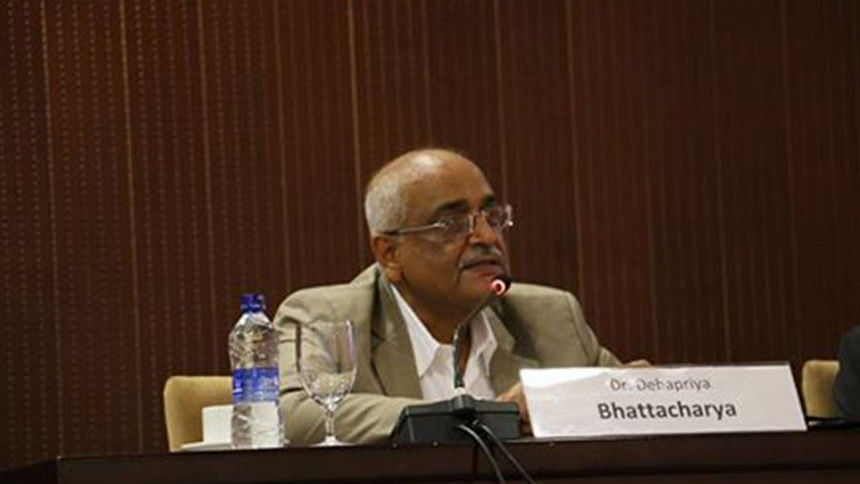Economy resilient, but challenges stay

The economy showed signs of resilience in the first half of fiscal 2016-17 in the face of global and domestic challenges, but the government needs to discipline the banking sector and improve the quality of public spending, according to the Centre for Policy Dialogue.
The think-tank yesterday released a report on the status of the economy, in which it said the economy enjoyed comfortable macroeconomic environment riding on robust GDP growth and rebounded investment, low inflationary pressure, declining interest rates, rising foreign currency reserve, manageable fiscal deficit and positive outcome in the stock market.
“At the moment, Bangladesh is successfully completing the fiscal year,” said CPD distinguished fellow Debapriya Bhattacharya at the report launching programme at the Brac Centre Inn Auditorium.
Areas of strength have been consolidated this year while weaknesses are seen in traditionally strong areas -- remittance, export and agriculture -- raising concern, he said.
Citing signs of growing private investment, Debapriya suggested strengthening reforms for maintaining the trend. The GDP growth has exceeded 7 percent but to increase it further to 8 to 9 percent, reform is a must.
The government needs to lower the interest rate of national savings certificates and adjust fuel prices and exchange rates to sustain the economic growth, as per the report.
“People have not benefited from the cut in fuel prices,” said CPD research fellow Towfiqul Islam Khan who presented the analysis.
The benefits of fuel price cuts should be shared among consumers, Bangladesh Petroleum Corporation and the government in a balanced way.
Reforms are also vital in the banking sector, local government management and public investment to ensure economic sustainability, CPD said in the report.
Global environment has continued to pose a new set of challenges including slowdown in international trade, tepid global recovery, Brexit, the possibility of the US opting out of the Trans-Pacific Partnership, renewed protectionism in global trade, and continued security and refugee concerns.
Though political conflicts were limited at the national level, the fiscal year kicked off amid a rise in terrorist activities that might have serious medium- to long-term impacts on economic prospects.
In regard to the downsides, declining trend of remittance inflow has remained a nagging concern.
Divergence in the pace of urban and rural inflation has been on the rise in spite of the overall decline in headline inflation rate.
Both revenue collection and public expenditure fell short of target, making implementation of the national budget of the current fiscal year more challenging.
When the 2016-17 fiscal budget was proposed, CPD projected that there would be a major shortfall of revenue earnings.
Referring to July-September revenue growth, it said the revenue collection would fall short of its target by Tk 40,000 crore by the fiscal end.
“There should not be any projection of budget implementation, which are impossible. It can be simple and no big revolution is required,” Debapriya said.
The annual development programme expenditure recovered to a certain extent but could not surpass the historical trend, according to Towfiqul Islam.
“Indeed, both resource mobilisation efforts and efficiency of resource use need to be significantly raised in the remaining two quarters of the fiscal year if the growth momentum is to be sustained and further strengthened.”
The analysis termed the country's debt situation as comfortable and it will remain so in the next five years.
“But the country should not be complacent,” the think-tank said.
While opting for financing mechanism for public sector projects, it is important to consider the maturity period, conditionalities, tied nature of debts, risk of currency mismatch, internal rate of return and quality of the project.
The banking sector continues to suffer from inherent weaknesses. The main concerns are the rising amount of non-performing loans, growing excess liquidity and weak governance.
CPD Executive Director Prof Mustafizur Rahman said talks were on on forming a banking commission for the last few years to sort out the accumulating problems in the sector.
The finance minister even spoke of forming such a commission in his last budget speech, Debapriya said.
“But it has not been formed. We are waiting for it to happen.”
About the remittance issue, CPD said that over the medium term, the sustainability of remittance inflow would not only depend on developing skilled workforce but also on governance issues such as dealing with money being transferred through informal channels.
While Bangladesh battles against its immediate challenges, the policymakers should not lose sight of the reform and governance issues in hand.
A set of institutional and policy reforms should be rigorously pursued in the areas of revenue mobilisation, public expenditure management, financial sector, and private investment, if needed, by taking bold steps.
“We are seeing only sparks in the private sector investment. It has to be seen if it turns into a fire,” said Debapriya on the growth of investment in the private sector.
He also pointed out emerging weaknesses in Bangladesh's traditionally strong areas such as export, remittance and agriculture.
Bangladesh has to go for exporting products and items in the service sector as its share in the global GDP is increasing, Prof Mustafizur said.
The government also needs to move forward step by step in implementing the new VAT system, as the preparation at the field level has not completed yet, according to the report.

 For all latest news, follow The Daily Star's Google News channel.
For all latest news, follow The Daily Star's Google News channel. 




Comments